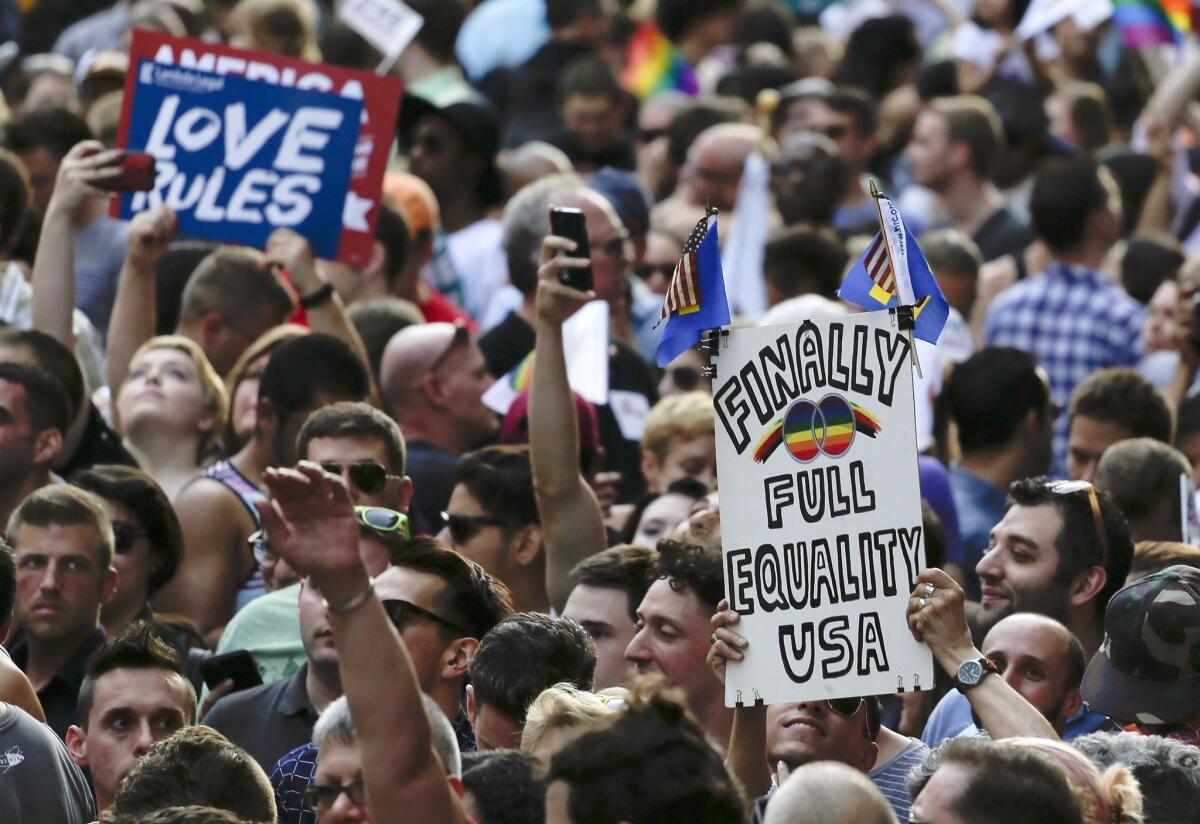Editorial: In ruling, high court recognizes ‘changed understandings of marriage’

Demonstrators gather at a rally in Greenwich Village on Friday, June 26 in New York to celebrate the Supreme Court’s ruling on gay marriage.
President Obama aptly described Friday’s Supreme Court decision establishing a right to same-sex marriage in all 50 states as “a victory for America.” The long-awaited ruling is the culmination of decades of activism, hard work and public education that have transformed attitudes toward gays and lesbians and the families they’ve formed.
Yet rather than creating a completely new right, the court embraced a deeper understanding of an existing one — just as it did nearly half a century ago when it overturned laws against marriage between people of different races. As Justice Anthony M. Kennedy noted in his lucid and lyrical majority opinion, “changed understandings of marriage are characteristic of a nation where new dimensions of freedom become apparent to new generations, often through perspectives that begin in pleas or protests and then are considered in the political sphere and the judicial process.”
By a 5-4 vote, the court found that bans on same-sex marriage — like bans on interracial marriage — violated the 14th Amendment’s guarantees of due process and equal protection of the laws. It did not matter, Kennedy wrote, that earlier generations didn’t read the Constitution that way.
“The nature of injustice is that we may not always see it in our own times,” Kennedy said. “The generations that wrote and ratified the Bill of Rights and the 14th Amendment did not presume to know the extent of freedom in all of its dimensions, and so they entrusted to future generations a charter protecting the right of all persons to enjoy liberty as we learn its meaning. When new insight reveals discord between the Constitution’s central protections and a received legal stricture, a claim to liberty must be addressed.”
In this society, it is the Supreme Court that has the responsibility to interpret the Constitution in light of changing realities. That is why the dissenters in Friday’s decision were wrong to accuse the majority of usurping the democratic process. In a characteristically scathing and sarcastic opinion, Justice Antonin Scalia called the decision “a naked judicial claim to legislative — indeed, super-legislative — power; a claim fundamentally at odds with our system of government.” He referred melodramatically to “this court’s threat to American democracy.”
Chief Justice John G. Roberts Jr. elaborated on the “anti-democratic” theme by arguing that the court’s decision deprived the cause of marriage equality of legitimacy by wresting it from the political process at a time when it was winning converts. Roberts wrote that “however heartened the proponents of same-sex marriage might be on this day, it is worth acknowledging what they have lost, and lost forever: the opportunity to win the true acceptance that comes from persuading their fellow citizens of the justice of their cause. And they lose this just when the winds of change were freshening at their backs.”
Roberts’ implication was that laws against same-sex marriage will fall regardless of what the court does. But that is not a foregone conclusion. On the day in 1967 that the court ruled that laws against interracial marriage were unconstitutional, such prohibitions were on the books in 16 states. It’s likely that, without a ruling from the court, several of the 39 states that refused to approve same-sex marriage would keep their prohibitions, despite the recent (and remarkable) change in public attitudes toward gays and lesbians. Such a patchwork would mock the idea that marriage equality is a fundamental right.
The dissenters also sounded another theme: that by extending civil marriage to same-sex couples, the court has undermined the freedoms of those who espouse traditional views of marriage. Justice Samuel A. Alito Jr. wrote that “those who cling to old beliefs will be able to whisper their thoughts in the recesses of their homes, but if they repeat those views in public, they will risk being labeled as bigots and treated as such by governments, employers, and schools.” Roberts warned that the decision might lead to government sanctions for religious institutions, such as a college that provides married student housing only to opposite-sex married couples or a religious adoption agency that declines to place children with same-sex couples.
The notion that this decision will silence religious (or other) critics of same-sex marriage is unpersuasive. As Kennedy wrote, “religions, and those who adhere to religious doctrines, may continue to advocate with utmost, sincere conviction that, by divine precepts, same-sex marriage should not be condoned.” If they have the courage of convictions, they won’t be prevented by this decision from exercising their 1st Amendment rights. Some religious leaders have acknowledged that the decision poses no threat to their teaching. Roman Catholic Bishop Gregory Hartmayer of Savannah, Ga., said the ruling “is primarily a declaration of civil rights and not a redefinition of marriage as the church teaches.”
The question raised by Roberts about accommodations for religious institutions is a more serious concern. But it is highly unlikely that religious colleges will lose their tax-exempt status for adhering to their traditional views about marriage. As Roberts noted, states that have legalized same-sex marriage have provided accommodation for religious believers. They can still do so after this ruling.
The genius of the American Constitution is that its lofty precepts about due process and equality can be adapted to new realities. That is what the court has done in this decision, and the country is better for it.
Follow the Opinion section on Twitter @latimesopinion and Facebook
More to Read
A cure for the common opinion
Get thought-provoking perspectives with our weekly newsletter.
You may occasionally receive promotional content from the Los Angeles Times.










